Public-spirited factors lead the list of reasons for considering law school among undergraduates in the United States, according to Before the JD: Undergraduate Views on Law School, a new report on student perspectives on legal education that is based on a survey by Gallup for AALS.
The survey found that undergraduates considering law school report their top reason is to pursue a career in politics, government, or public service. Other top factors include being passionate about the work, an opportunity to give back to society, and to advocate for social change. The ability to qualify for a high-paying job and the prestige of being a lawyer both rank lower on the list of 15 factors.
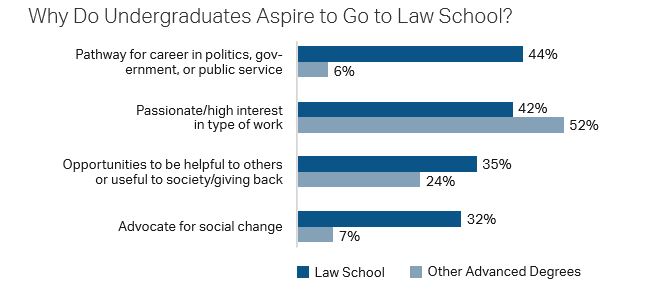
More than 22,000 college students and over 2,700 law students completed the survey which captured details on their career aspirations, sources of information and advice, and academic backgrounds. The report also explores demographic differences in survey respondents by gender, parental education, race/ethnicity, and academic achievement.
“This is the first known study in more than 50 years of undergraduate views on law school,” said Judith Areen, Executive Director of AALS. “It is our hope that this report will be useful not only to law schools and aspiring law students, but to everyone who cares about law and justice. We all have a stake in the quality of the next generation of lawyers and judges.”
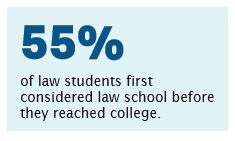 Surprisingly, the survey found that more than half of law students first considered law school before college, and one-third before high school. The report also includes important findings about first-generation college students. The connection between parental education and college enrollment has been widely recognized in higher education. According to the most recently available data from the National Center for Education Statistics, about one third of college students nationwide are first-generation. Before the JD shows that only one-fifth of undergraduates considering law school are first-generation.
Surprisingly, the survey found that more than half of law students first considered law school before college, and one-third before high school. The report also includes important findings about first-generation college students. The connection between parental education and college enrollment has been widely recognized in higher education. According to the most recently available data from the National Center for Education Statistics, about one third of college students nationwide are first-generation. Before the JD shows that only one-fifth of undergraduates considering law school are first-generation.
A similar gap is also evident when considering advanced degree holders. Nationwide, according to U.S. Census data, only 12 percent of individuals age 45 to 65 (typical age range of parents of college students) have an advanced degree. By contrast, Before the JD found that half of undergraduates considering law school have at least one parent with an advanced degree.
The report concludes, “… it will take deliberate effort on the part of law schools to level the playing field for qualified applicants, particularly if they are the first generation in their family to graduate from college.” Additional highlights from the report and ordering information can found at www.aals.org/research.
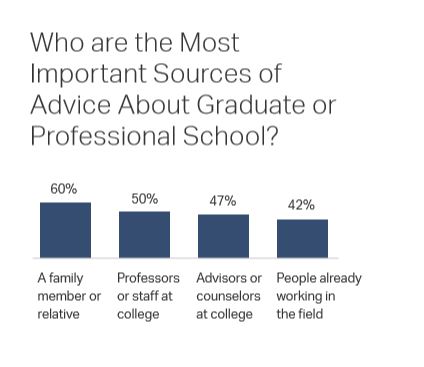
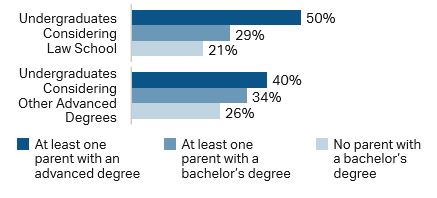
Undergraduates considering graduate or professional school are more likely to have at least one parent with an advanced degree compared with peers who are not considering graduate school, according to Beyond the Bachelor’s: Undergraduate Perspectives on Graduate and Professional Degrees, a new report based on a survey by Gallup for the AALS and the Law School Admission Council (LSAC).
The survey found that 41 percent of students considering graduate or professional education have at least one parent with an advanced degree compared to 33 percent whose parents hold a bachelor’s degree and 26 percent whose parents do not hold a four-year degree.
According to the report, students whose parents do not hold a bachelor’s degree were the least likely to report seeing or receiving information on campus about graduate or professional degrees. Findings from the report show the already narrow pool of first-generation college students considering graduate and professional school face additional barriers depending on a variety of factors.
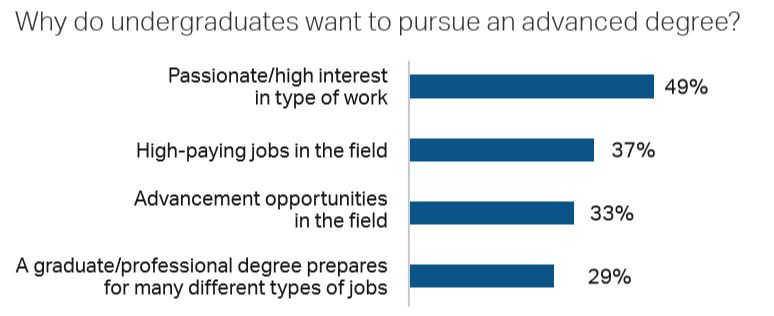
The report concludes, “…To encourage more first-generation students to pursue advanced degrees, colleges and universities need to do more to assure that information equitably reaches all undergraduates. …This [report] will enable graduate and professional schools to provide more relevant information to prospective students and, where appropriate, to revise their curricula to better meet the goals of incoming students.”
The report also explores demographic differences in survey respondents by gender, parental education, race/ethnicity, and academic achievement.
 Additional findings from the report:
Additional findings from the report:
• Undergraduates unlikely to pursue an advanced degree are more likely to be men than women, as are undergraduates undecided about pursuing (both 57 percent to 43 percent) and those who have never thought about an advance degree (59 percent to 41 percent).
• The pool of undergraduates likely to pursue an advanced degree includes higher percentages of Asian, Black and Hispanic students than students unlikely to do so.
• Undergraduates likely to pursue an advanced degree are more likely than their counterparts
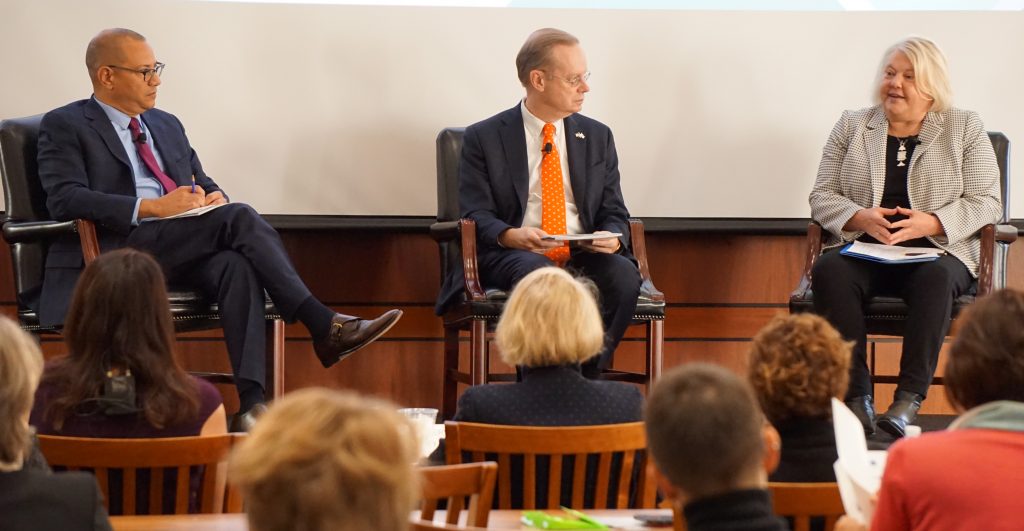
Beyond the Bachelor’s Launch event at Gallup in Washington, DC. L to R: John Valery White (Professor and Former Provost, University of Nevada, Las Vegas), Kent Syverud (President and Chancellor, Syracuse University), and Kellye Testy (President and CEO, Law School Admission Council).